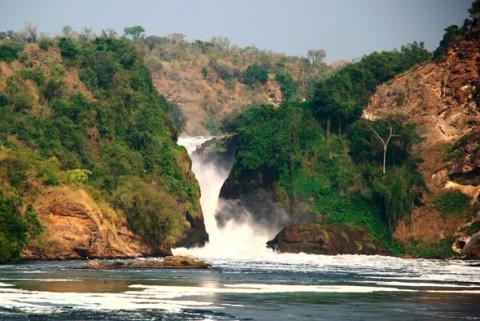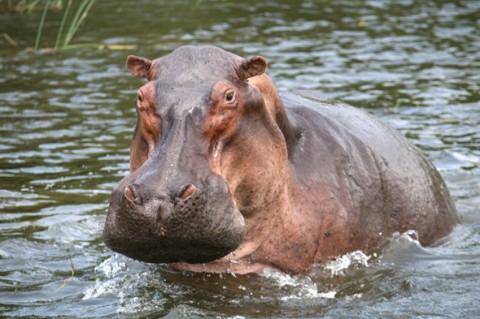When the boat starts to rock, I’m not entirely reassured when the guide says, “Don’t worry. Just a hippo trying to come up under us.”
Right. No big deal. We’re about to capsize in the middle of a herd of twenty hippos, spread across the river like fat, warm rocks, because one of them understands Archimedes’ principle of leverage. The lever in this case being a 3,000-pound hippo’s back under a much lighter boat.
No problem. We’re not the first people it’s happened to. In fact, back in 1864, Samuel Baker[1], who was getting ready to claim discovery to a waterfall plenty of people already knew was there, had it happen to him — a hippo coming right up under his boat.
Last night, I’d sat on my balcony at Paraa Lodge[2], trying to hear Murchison Falls[3]. Squeeze the entire Nile River through a slot six meters wide in a corner of Uganda[4] (one of Traveler‘s picks for the World’s Best Trips of 2013[5]), it’s going to make some noise, right? How loud can 11,000 cubic feet of falling water per second be, and how far off can you hear it?
A rumble, like a storm in the distance. The rush of the river like a hand across silk.
Then the falls.
When I was a kid and would try to figure out what happened after you fell off the edge of the world, I always saw it from above, like standing at the top of a cliff looking down. But Murchison is like already being off the edge, down at the bottom, watching the world pour onto you. The Nile stuffs itself through a V-shaped crack, the fall line 140 feet up cutting a horizon against the sky. In the old Road Runner cartoons[6], the coyote fell off a hundred cliffs like this. Reason enough for the whole trip.
But it’s not exactly the point of this story.
The point is, on the way back to Paraa, it’s just three of us in the boat: me, Peggy, and the guide. Everybody else has offloaded to climb up to see the falls from the top, but a bad knee isn’t going to let me do that, and I don’t want to ruin the illusion anyway.
Now I know what happens when you fall off the edge of the world. You end up surrounded by hippos, crocodiles–some just hours old–watching from the banks, trees full of colobus monkeys that look like skunks who’ve learned to climb.
And I’m very happy.
But Peggy has something else in mind. She turns to the guide and says, “I’d really like to see a malachite kingfisher[7].”
Malachite kingfishers are incredibly beautiful birds: yellow breasted, red beaked, their backs the color of a sky about an hour before a storm.
They’re also about the size of a hummingbird, and on either side of the boat is nothing but wild Ugandan jungle passing by at a good 30 miles per hour as we rip downstream on the waterfall-encouraged current.
I’m a good animal spotter. I was taught by my father, the absolute best, who raised me to treat the whole world as one of those “how many animals are hidden in this picture” games from a kid’s magazine.
I’ve spent my entire life being the first person (or second, when I’m with Dad) to see an animal, so I know what the odds are. Half-mile-wide river, fast boat, tall grass, and thick jungle.
I laugh. Ain’t no way at all.
Besides, this is Africa. Hippos like speed bumps in the water. Elephants everywhere. We saw more than a hundred giraffes one morning before breakfast.
Who cares about a tiny bird?
But about five minutes after Peggy says she wants to see a malachite kingfisher, the guide cuts the engine, spins the boat around, and points toward a patch of reeds. “There’s one.”
The bird barely twitches a feather as we pull to within a couple yards of it. Its bright orange feet grip the reed where it’s perched, the tiny flash of colorful magic pulled out of the landscape like a stream of gems poured from a magician’s hat.
Which leaves me with a single question: no matter how carefully we look, no matter how much attention we pay, just how much of the world’s beauty eludes us entirely? When we’re on the road, how many little things do we miss, looking for the big ones?
What’s waiting if you’re willing to fall off the edge of the world and keep your eyes wide open?
Edward Readicker-Henderson[8] is a contributing editor at National Geographic Traveler. Read his life-affirming ode to the healing power of travel, “Cheating Death[9].”
Can you remember a small moment that had a big impact on how you view the world? Share your story with us by leaving a comment:
References
- ^ Wikipedia site – Samuel Baker (en.wikipedia.org)
- ^ Paraa Lodge site (www.paraalodge.com)
- ^ Murchison Falls National Park site (www.murchisonfallsnationalpark.com)
- ^ National Geographic Travel – Uganda Guide (travel.nationalgeographic.com)
- ^ National Geographic Travel – World’s Best Trips 2013: Uganda (travel.nationalgeographic.com)
- ^ Wikipedia site – Wile E. Coyote & The Road Runner (en.wikipedia.org)
- ^ Guardian site – “Mystery bird: Malachite kingfisher” (www.guardian.co.uk)
- ^ Edward Readicker-Henderson’s Route of Seeing site (www.routeofseeing.com)
- ^ National Geographic Traveler – “Cheating Death” (travel.nationalgeographic.com)

